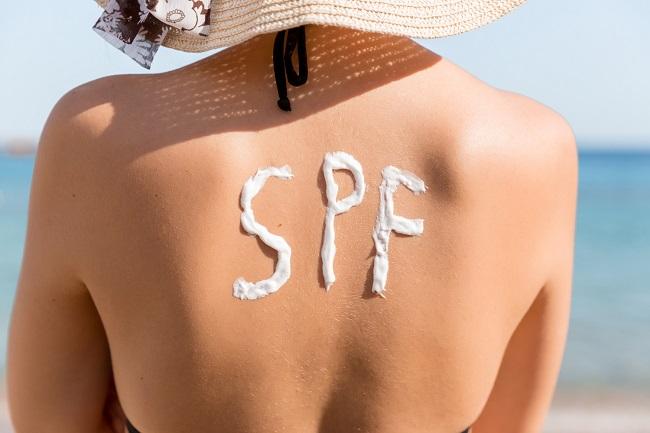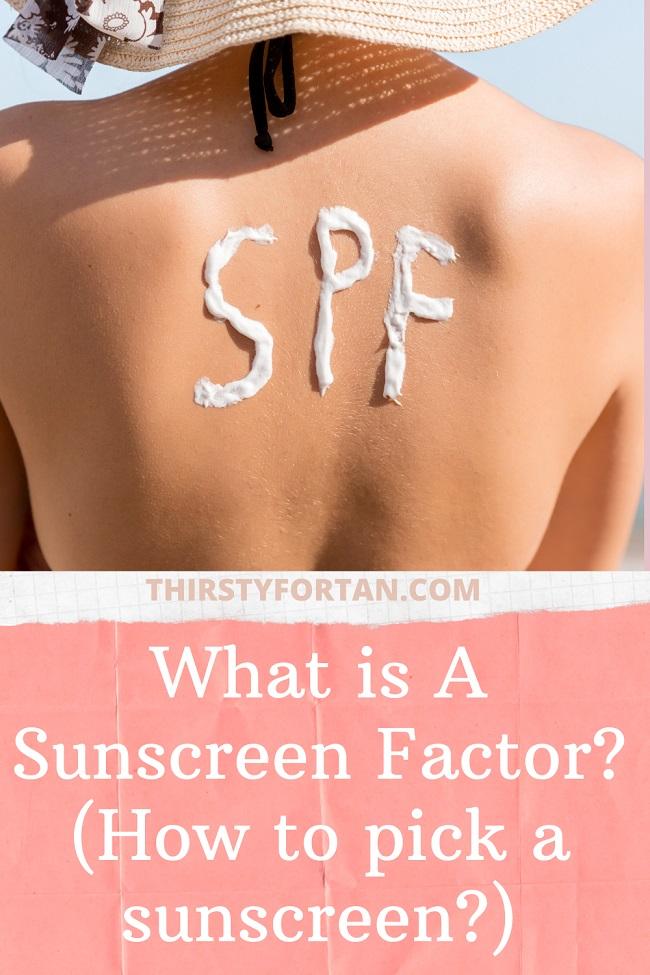While most of us know how important it is to wear sunscreen or at least some of the benefits you can receive from doing so, not many people really know the ins and outs of the sunscreen products they’re using on their face and body. Of course, there are so many different elements to this essential product, but the protection it provides is one of the core ones and something practical which is good to know when choosing a sunscreen. If you want to find out more about what a sunscreen factor is, read on.
What is a sunscreen factor?
You’ve come here to discover what a sunscreen factor is, so what is it? In very simple, easy to understand terms, a sunscreen factor is essentially the number on the packaging of your sunscreen or other sun protection product which determines how protective it is of your skin, and how much of the UV rays emitted by the Sun will be filtered out.
You can find sunscreens of varying SPFs (sun protection factors) anywhere, but it’s important to understand each one.
In order to explain the different sunscreen factors, it’s also important to understand how the Sun affects our skin and the science behind everything. When you are out in broad sunlight (even if it’s not very sunny) during the daytime, your skin is exposed to the waves which come from the Sun and account for skin concerns such as sunburn or aging – these are called UV rays.
There are two types of UV rays, UVA and UVB, which both have different wavelengths from each other, and therefore act in different ways around the skin. As a general rule, UVA penetrates into the deeper layers of the skin and is responsible for more buildable, long-term concerns, such as premature aging. On the other hand, UVB only comes into contact with upper layers of the skin, and is responsible for more immediate, short-term damage, such as sunburn.
When you look at the SPF rating of your product, you’re only looking at the rating of protection against UVB rays, but it’s equally as important to ensure that you have adequate protection for UVA rays, too. To do this you need to have a closer look at the packaging and there are a few things which can tell you that the product has this specific protection. Something which says, ‘broad-spectrum’, or has a star rating under ‘UVA’ will tell you the information you need to know.
Also read:
7 Things A Sunscreen Does to Your Skin (Explained)
What is The Best Sunscreen? (For Body or Face)
What Do the Numbers Mean on Sunscreen? (Explained)
When should I use different sunscreen factors?
Now that you know about what a sunscreen factor itself is, you can put that knowledge into practice. Most likely, you’ll know that it’s sensible to adopt certain things concerning your skincare and body care to adapt to your certain lifestyle or conditions. For example, you wouldn’t be applying a moisturiser intended for dry skin if you had oily skin.
Well, the same thing goes for your sunscreen, for both face and body, and you need to learn how to adapt these, as sunscreen is arguably the most important step of your skincare and body care routine, and it’s most effective when knowledge is applied appropriately. It’s common sense but, in case you hadn’t thought about it, you need a higher SPF in summer, or when the days are sunnier, and a lower SPF in the winter, or when the days are darker. And yes, you do need to be using your sunscreen all year round if you want to reap the benefits and properly protect and maintain your skin.
For most people, SPF 30 is enough protection for a sunny day because, as you’ll see in a bit, anything higher, such as SPF 50 is only marginally better than this, and it isn’t worth it. However, if you have a skin condition, your doctor or dermatologist may recommend that you wear SPF 50, for extra precaution, so you can speak to a specialist about this. During the winter, or when you don’t need so much protection, SPF 20 or even 15 should do you fine, especially if you’re not planning on spending much time outside.
Even if you are staying inside for most of the day, you should still use sunscreen, as it will protect you from any sunlight which may come through windows, which can still have an impact.
Here is a table illustrating the different sun protection factors, and the percentage of UVB rays which they filter out:
How to pick a sunscreen that’s perfect for you!
When you are interested in purchasing sunscreen, it is important to understand that it is not a ‘one size fits all’ situation. While many products could claim to be suitable for a variety of purposes, it’s important to be educated on this topic in order to find exactly what you’re looking for.
Also read: Does Sunscreen Block Vitamin D? (Explained)
- SUPERIOR ENDURANCE VS. SWEAT & WATER — From family fun to hardcore competition, Banana Boat Sport Sunscreen provides strong sun protection that stays on so you can play on
- CLINICALLY PROVEN UVA/UVB PROTECTION — This SPF 50+ broad spectrum sunscreen spray protects skin from the sun's harmful UV rays
- 3-fluid ounce travel size bottle of Neutrogena Ultra Sheer Dry-Touch Non-Greasy Sunscreen with SPF 70 for broad spectrum UVA/UVB protection
- This lightweight and sheer sunscreen is fast-absorbing with Dry-Touch technology for a non-greasy, matte finish that leaves skin feeling clean. The face and body sunscreen is formulated with Helioplex for superior sunburn protection for your skin
- EltaMD UV Clear Face Sunscreen is a lightweight oil free sunscreen made with transparent Zinc Oxide that leaves no white cast after applying and helps block damaging UVA and UVB rays from the sun
- Dermatologist recommended face sunscreen for acne prone skin is oil-free, protects against breakouts, and is an essential acne sunscreen for those with acne prone skin care concerns and other sensitive skin types like rosacea and hyperpigmentation
If you click Buy on Amazon and make a purchase, I'll earn a small commission at no additional cost to you.
Skin colour
Firstly, one of the most widely made assumptions about sunscreen, our skin, and its relationship with the Sun, is that those with darker skin don’t need as much protection as those with lighter skin. Clearly, this is a big misconception, however it’s easy to see why someone may think this, despite that fact that it’s not the case.
If you know anyone with very pale skin, or you have pale skin yourself, you’ll probably notice that you burn much easier than someone with darker skin, and it might even appear like they don’t burn at all. While the visible damage on someone with paler skin is much more obvious, remember that your skin can still be suffering from damage, and sunburn is just a defense mechanism. Often, those with darker skin can suffer from sunburn, even if it’s just light sunburn, but it is usually much less obvious, as it doesn’t show so easily on the skin.
For these reasons, your skin colour doesn’t make any difference to your chance of sunburn, and it should play no role in deciding what sunscreen to use – someone with lighter skin should use the same factor as someone with darker skin when they’re in the same conditions.
Skin type
If you have ever delved into the world of skincare, you’ll know, for a fact, that different skin types should be treated differently. Whether that’s based on which products you use, the ingredients inside them, the frequency, or just what you do to your skin altogether, different skin types should have different routines, and this applies to sunscreen too, as it is a form of skincare, after all.
If you’re looking for the sunscreen properties which will suit your skin type, here is a handy list:
- Oily skin: if you have oily skin, the two main properties to look out for in any sunscreen that you buy are ‘oil-free’ and ‘non-comedogenic’. An oil-free sunscreen means that it won’t contribute to any additional oils on the skin’s surface, and non-comedogenic means the product won’t clog your pores, which is often a large problem for those with oily skin. If you’re looking to enhance your skincare experience even further, finding a sunscreen with a suitable factor which also doubles up as a moisturiser can be a smart move, as this reduces as much product piling up on your face as possible!
- Dry or sensitive skin: if you have dry or sensitive skin, making sure that your products are fragrance-free and gentle is a really important thing, which is incredibly simple but can make a big difference. Look out for moisturising ingredients such as hyaluronic acid, glycerin or ceramides to give your skin an extra hydration boost and even consider using a moisturising sunscreen on top of your regular moisturiser.
- Combination skin: if you have combination skin, choosing something which is suitable for oily skin is a really good place to start. Because those with combination skin usually suffer from dryness too, skipping out a moisturiser (as you could do if you have oily skin) is probably not a good idea, so make sure to keep these two products separate. Physical sunscreen is really good for combination skin.
- Normal skin: if you have normal skin, you’re in the easiest position! To be honest, anything which acts as a good sun protector is made of high-quality ingredients and isn’t formulated to target one specific concern should be great, and you can find a suitable sunscreen for normal skin almost anywhere.
Related:
What Type of Sunscreen is Best for Black Skin? (Explained)
What SPF Sunscreen Should You Wear to Exercise Outside? (Explained)
Final thoughts
To wrap everything up, it’s useful to know about SPFs, and how they work on your skin, so that you can be protecting yourself in the best way possible and avoiding as much damage as possible. Of course, this does require some common sense, but now that you have all the information you need, you can feel confident when exposing yourself to the sunlight, rain or shine!







